

A Data Trust-Sphere Analogous To A Life Biosphere : Or How Three Into One Will Go? “One becomes two, two becomes three, and out of the third comes the NEW one as the fourth.”
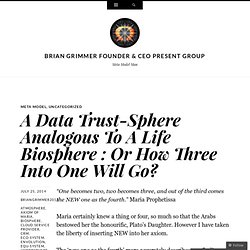
Maria Prophetissa Maria certainly knew a thing or four, so much so that the Arabs bestowed her the honourific, Plato’s Daughter. However I have taken the liberty of inserting NEW into her axiom. The ‘new one as the fourth’ more accurately describes our findings with the Meta Model for Process. Namely, that the fourth order effect is the heart which transcends the other three. The biosphere is also a fourth order effect allowing progression between it’s three sub-spheres which can all come together to sustain life in it’s many different forms.
As predicted by the Meta Model; the biosphere is a three into one phenomenon. Data is the New Oil: From Privacy to Publicy. Bio Stowe Boyd Stowe Boyd is an internationally recognized authority on social tools and their impact on media, business, and society.

He is best known for his commentary on the social revolution, the rise of social tools, and the new world ahead of us at stoweboyd.com, his random observations and curation at underpaidgenius.com, and his public speaking. In recent years, Boyd has spoken at Web 2.0, Enterprise 2.0, Office 2.0, Net:work, Reboot, Defrag, 140 Characters, Lift, Shift, Sibos, TEDxMidAtlantic, SxSWi 2012 and many others. Jamais Cascio Jamais Cascio is a San Francisco Bay Area-based writer and ethical futurist specializing in design strategies and possible outcomes for future scenarios. In 2003, he co-founded WorldChanging.com, the award-winning website dedicated to finding and calling attention to models, tools and ideas for building a "bright green" future. Data Cuisine. Center for Data Innovation » 15 Essential Journalists Writing About Data. In Depth Published on May 30th, 2014 | by Travis Korte As more media outlets begin to cover data-driven innovation, keeping up with the latest news can be a challenge.
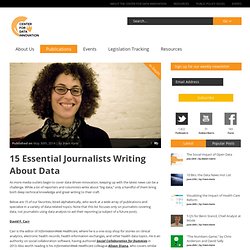
While a lot of reporters and columnists write about “big data,” only a handful of them bring both deep technical knowledge and great writing to their craft. Below are 15 of our favorites, listed alphabetically, who work at a wide array of publications and specialize in a variety of data-related topics. Note that this list focuses only on journalists covering data, not journalists using data analysis to aid their reporting (a subject of a future post). David F. Trust, Not Data, Is the New Oil. Does the CFO Need to Become a Technologist? CIO — Technology today, particularly big data and analytics, is disrupting roles throughout the enterprise, whether it's the CIO that needs to seek new ways to be a strategic partner to the business or the CMO constantly faced with decisions about technology that can make the marketing function more data-driven and efficient.
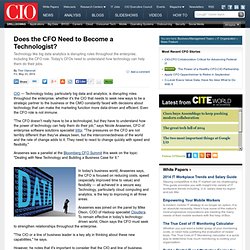
Even the CFO role is not immune. "The CFO doesn't really have to be a technologist, but they have to understand how the power of technology can help them do their job," says Nicole Anasenes, CFO of enterprise software solutions specialist Infor. "The pressures on the CFO are not terribly different than they've always been, but the interconnectedness of the world and the rate of change adds to it. They need to react to change quickly with speed and flexibility. " Anasenes was a panelist at the Bloomberg CFO Summit this week on the topic: "Dealing with New Technology and Building a Business Case for It. " Gear Analytics. The data scientist v2.0. I’ve been thinking deeply about the need for more people facile with extracting meaning from data - or a “data scientist” for lack of a better term.
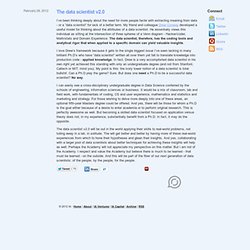
My friend and colleague Drew Conway developed a useful model for thinking about the attributes of a data scientist. He essentially views this individual as sitting at the intersection of three spheres of a Venn diagram - Hacker/coder, Math/stats and Domain Experience. The data scientist, therefore, has the coding tools and analytical rigor that when applied to a specific domain can yield valuable insights. I love Drew’s framework because it gets to the single biggest issue I’ve seen lacking in many brilliant Ph.D’s who have “data scientist” written all over them yet fail to translate knowledge into production code - applied knowledge.
Big Data? No. Big Information as a Service. I've been going through the Gartner hypecycle these last few weeks, regarding Big Data.
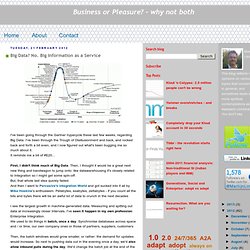
I've been through the Trough of Disillusionment and back, and rocked back and forth a bit even, and I now figured out what's been bugging me so much about it. It reminds me a bit of #E20...First, I didn't think much of Big Data. Then, I thought it would be a great next new thing and bandwagon to jump onto: like datawarehousing it's closely related to Integration so I might get some spin-off. But, that whole last idea quickly faded. And then I went to Pervasive's integration World and got sucked into it all by Mike Hoskins's enthusiasm. I see the largest growth in machine-generated data. Then, the batch windows would grow smaller, or rather: the demand for updates would increase. Big Data Analytics: The Future is Already Here. As the Big Data movement gains momentum we’ll find more and more reasons to rethink how we actually create value out of data.
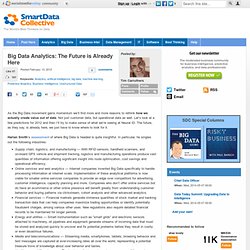
Not just customer data, but operational data as well. Let’s look at a few predictions for 2012 and then I’ll try to make sense of what we’re seeing at Neural ID. Big Data Analytics: Trends to Watch For in 2012 - Harlan Smith - Voices. Over the last several years, there has been a massive surge of interest in Big Data Analytics and the groundbreaking opportunities it provides for enterprise information management and decision making.
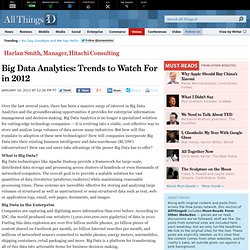
Big Data Analytics is no longer a specialized solution for cutting-edge technology companies — it is evolving into a viable, cost-effective way to store and analyze large volumes of data across many industries. But how will this translate to adoption of these new technologies?